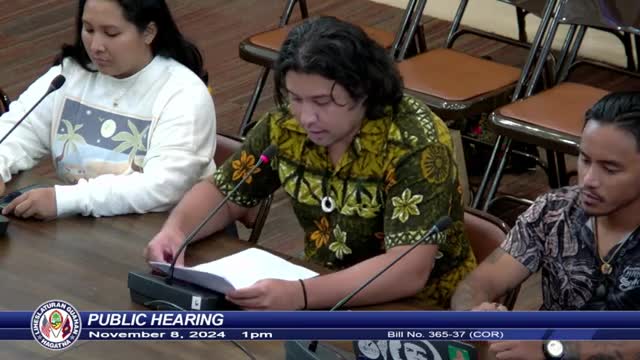Cooperatives offer path to economic resilience for Guam
November 08, 2024 | Environment, Revenue and Taxation, Labor, Procurement, and Statistics, Research, and Planning , Legislative, Guam
This article was created by AI summarizing key points discussed. AI makes mistakes, so for full details and context, please refer to the video of the full meeting. Please report any errors so we can fix them. Report an error »

In a recent government meeting, advocates for economic cooperatives in Guam presented compelling arguments for the adoption of Bill 365-37, which aims to introduce cooperative business models to the island. Proponents emphasized the potential of cooperatives to foster economic resilience, empower local communities, and create a more equitable distribution of wealth.
Jordan, a local business owner, highlighted the cooperative model's principles of shared ownership and democratic control, suggesting that such structures could have provided greater stability for businesses during the COVID-19 pandemic. He argued that cooperatives allow for collective decision-making and reinvestment of profits into the community, aligning with Guam's cultural values of reciprocity and community support. \"When hard times come, decisions about layoffs and cuts aren't made by executives on the other side of the world,\" he stated, advocating for a model that prioritizes local needs and sustainability.
Josh Laurenti, a community organizer, echoed these sentiments, pointing out the struggles many residents face due to rising living costs. He argued that cooperatives could help retain wealth within the community, ensuring that profits are distributed equitably and that local businesses thrive. Laurenti shared a personal experience of attempting to implement a cooperative model in a nonprofit organization, which ultimately failed due to resistance from leadership. He urged the legislature to support the bill as a means to empower workers and entrepreneurs in Guam.
Theo de Merzbang, CEO of Pacific Nesian Equities, reinforced the importance of economic democracy, citing studies that link cooperative models to reduced income inequality and poverty. He noted that cooperatives tend to have higher job retention rates and a greater commitment to sustainable practices, as workers who are also owners are more invested in their enterprises. De Merzbang emphasized that cooperatives could provide a framework for a circular economy, where profits are reinvested back into the community.
The discussions underscored a growing recognition of the need for alternative economic structures in Guam, particularly in light of the vulnerabilities exposed by the pandemic. Advocates believe that by passing Bill 365-37, Guam could pave the way for a more resilient and self-determined economy, one that reflects the values and needs of its people. The bill's supporters are hopeful that it will lead to a future where local businesses thrive through cooperation and community engagement.
Jordan, a local business owner, highlighted the cooperative model's principles of shared ownership and democratic control, suggesting that such structures could have provided greater stability for businesses during the COVID-19 pandemic. He argued that cooperatives allow for collective decision-making and reinvestment of profits into the community, aligning with Guam's cultural values of reciprocity and community support. \"When hard times come, decisions about layoffs and cuts aren't made by executives on the other side of the world,\" he stated, advocating for a model that prioritizes local needs and sustainability.
Josh Laurenti, a community organizer, echoed these sentiments, pointing out the struggles many residents face due to rising living costs. He argued that cooperatives could help retain wealth within the community, ensuring that profits are distributed equitably and that local businesses thrive. Laurenti shared a personal experience of attempting to implement a cooperative model in a nonprofit organization, which ultimately failed due to resistance from leadership. He urged the legislature to support the bill as a means to empower workers and entrepreneurs in Guam.
Theo de Merzbang, CEO of Pacific Nesian Equities, reinforced the importance of economic democracy, citing studies that link cooperative models to reduced income inequality and poverty. He noted that cooperatives tend to have higher job retention rates and a greater commitment to sustainable practices, as workers who are also owners are more invested in their enterprises. De Merzbang emphasized that cooperatives could provide a framework for a circular economy, where profits are reinvested back into the community.
The discussions underscored a growing recognition of the need for alternative economic structures in Guam, particularly in light of the vulnerabilities exposed by the pandemic. Advocates believe that by passing Bill 365-37, Guam could pave the way for a more resilient and self-determined economy, one that reflects the values and needs of its people. The bill's supporters are hopeful that it will lead to a future where local businesses thrive through cooperation and community engagement.
View the Full Meeting & All Its Details
This article offers just a summary. Unlock complete video, transcripts, and insights as a Founder Member.
✓
Watch full, unedited meeting videos
✓
Search every word spoken in unlimited transcripts
✓
AI summaries & real-time alerts (all government levels)
✓
Permanent access to expanding government content
30-day money-back guarantee
